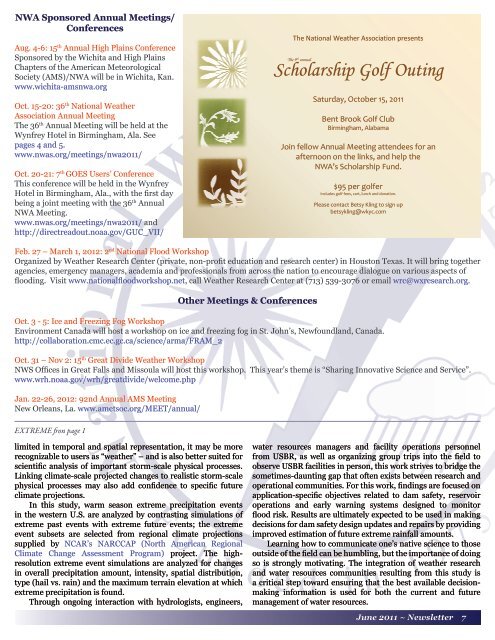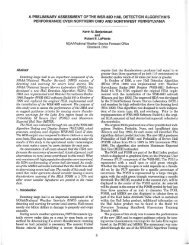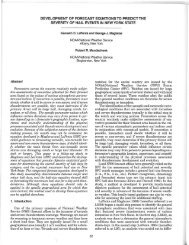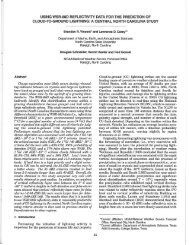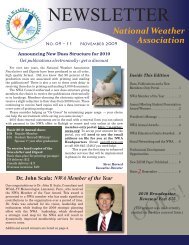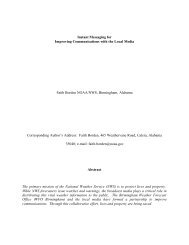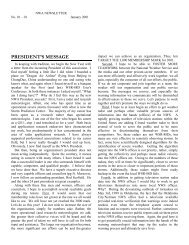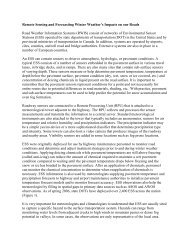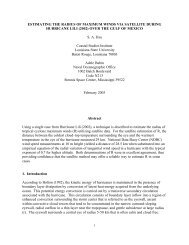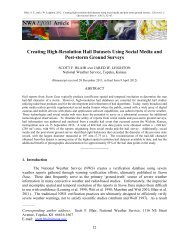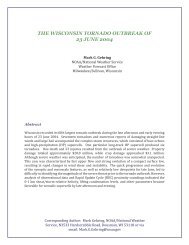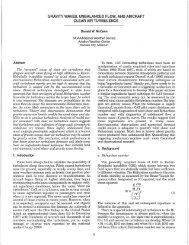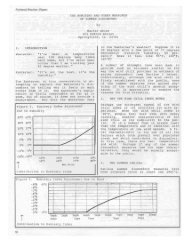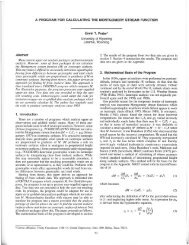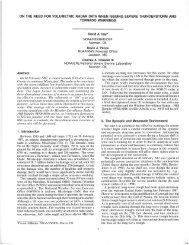NEWSLETTER - National Weather Association
NEWSLETTER - National Weather Association
NEWSLETTER - National Weather Association
Create successful ePaper yourself
Turn your PDF publications into a flip-book with our unique Google optimized e-Paper software.
NWA Sponsored Annual Meetings/<br />
Conferences<br />
Aug. 4-6: 15 th Annual High Plains Conference<br />
Sponsored by the Wichita and High Plains<br />
Chapters of the American Meteorological<br />
Society (AMS)/NWA will be in Wichita, Kan.<br />
www.wichita-amsnwa.org<br />
Oct. 15-20: 36 th <strong>National</strong> <strong>Weather</strong><br />
<strong>Association</strong> Annual Meeting<br />
The 36 th Annual Meeting will be held at the<br />
Wynfrey Hotel in Birmingham, Ala. See<br />
pages 4 and 5.<br />
www.nwas.org/meetings/nwa2011/<br />
Oct. 20-21: 7 th GOES Users’ Conference<br />
This conference will be held in the Wynfrey<br />
Hotel in Birmingham, Ala., with the first day<br />
being a joint meeting with the 36 th Annual<br />
NWA Meeting.<br />
www.nwas.org/meetings/nwa2011/ and<br />
http://directreadout.noaa.gov/GUC_VII/<br />
The <strong>National</strong> <strong>Weather</strong> <strong>Association</strong> presents<br />
<br />
<br />
<br />
Saturday, October 15, 2011<br />
Bent Brook Golf Club<br />
Birmingham, Alabama<br />
Join fellow Annual Meeting attendees for an<br />
afternoon on the links, and help the<br />
NWA’s Scholarship Fund.<br />
$95 per golfer<br />
Includes golf fees, cart, lunch and donation.<br />
Please contact Betsy Kling to sign up<br />
betsykling@wkyc.com<br />
Feb. 27 – March 1, 2012: 2 nd <strong>National</strong> Flood Workshop<br />
Organized by <strong>Weather</strong> Research Center (private, non-profit education and research center) in Houston Texas. It will bring together<br />
agencies, emergency managers, academia and professionals from across the nation to encourage dialogue on various aspects of<br />
flooding. Visit www.nationalfloodworkshop.net, call <strong>Weather</strong> Research Center at (713) 539-3076 or email wrc@wxresearch.org.<br />
Other Meetings & Conferences<br />
Oct. 3 - 5: Ice and Freezing Fog Workshop<br />
Environment Canada will host a workshop on ice and freezing fog in St. John’s, Newfoundland, Canada.<br />
http://collaboration.cmc.ec.gc.ca/science/arma/FRAM_2<br />
Oct. 31 – Nov 2: 15 th Great Divide <strong>Weather</strong> Workshop<br />
NWS Offices in Great Falls and Missoula will host this workshop. This year’s theme is “Sharing Innovative Science and Service”.<br />
www.wrh.noaa.gov/wrh/greatdivide/welcome.php<br />
Jan. 22-26, 2012: 92nd Annual AMS Meeting<br />
New Orleans, La. www.ametsoc.org/MEET/annual/<br />
EXTREME fron page 1<br />
limited in temporal and spatial representation, it may be more<br />
recognizable to users as “weather” – and is also better suited for<br />
scientific analysis of important storm-scale physical processes.<br />
Linking climate-scale projected changes to realistic storm-scale<br />
physical processes may also add confidence to specific future<br />
climate projections.<br />
In this study, warm season extreme precipitation events<br />
in the western U.S. are analyzed by contrasting simulations of<br />
extreme past events with extreme future events; the extreme<br />
event subsets are selected from regional climate projections<br />
supplied by NCAR’s NARCCAP (North American Regional<br />
Climate Change Assessment Program) project. The highresolution<br />
extreme event simulations are analyzed for changes<br />
in overall precipitation amount, intensity, spatial distribution,<br />
type (hail vs. rain) and the maximum terrain elevation at which<br />
extreme precipitation is found.<br />
Through ongoing interaction with hydrologists, engineers,<br />
water resources managers and facility operations personnel<br />
from USBR, as well as organizing group trips into the field to<br />
observe USBR facilities in person, this work strives to bridge the<br />
sometimes-daunting gap that often exists between research and<br />
operational communities. For this work, findings are focused on<br />
application-specific objectives related to dam safety, reservoir<br />
operations and early warning systems designed to monitor<br />
flood risk. Results are ultimately expected to be used in making<br />
decisions for dam safety design updates and repairs by providing<br />
improved estimation of future extreme rainfall amounts.<br />
Learning how to communicate one’s native science to those<br />
outside of the field can be humbling, but the importance of doing<br />
so is strongly motivating. The integration of weather research<br />
and water resources communities resulting from this study is<br />
a critical step toward ensuring that the best available decisionmaking<br />
information is used for both the current and future<br />
management of water resources.<br />
June 2011 ~ Newsletter 7


